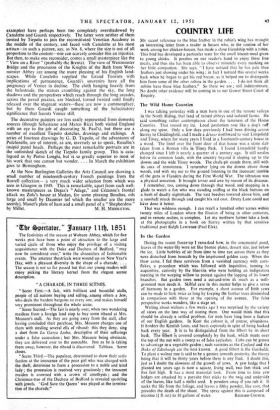The Wild Home Counties I was talking yesterday with a
man born in one of the remote valleys in the North Riding, that land of ruined abbeys and isolated farms. He said something rather contemptuous about the tameness of the Home Counties. That roused my ire. Local patriotism rose like a dog's ruff along my spine. Only a few days previously I had been driving across Surrey to Chiddingfold, and I made a detour northward to visit Limpsfield and Titsey, where for many years I lived in a fourteenth-century house in a wood. The lintel over the front door of that house was a stone slab taken from a Roman villa in Titsey Park. I found Limpsfield hardly changed since I left it nearly a quarter of a century ago. It still nestles below its common lands, with the country beyond it sloping up to the downs and the wide Titsey woods. The chalk-pit stands there, still with its aura of remoteness. I remember lying on the downs above those woods, and with my ear to the ground listening to the incessant rumble of the guns in Flanders during the First World War. The vibration was a physical sensation. It brought terror and awe by reason of its distance.
I remember, too, coming down through that wood, and stopping in a glade to watch a fox who was standing sniffing at the black buttons on a bush of deadly nightshade. The vast beeches towered above him, and a sunshaft struck through and caught his red coat. Drury Lane could not have done it better.
That was wildness enough. I can recall a hundred other scenes within twenty miles of London where the illusion of being in other centuries, and in remote realms, is complete. Let my northern farmer take a look at the photographs in a book on Surrey written by that sensitive traditional poet Ralph Lawrence (Paul Elek).


































 Previous page
Previous page